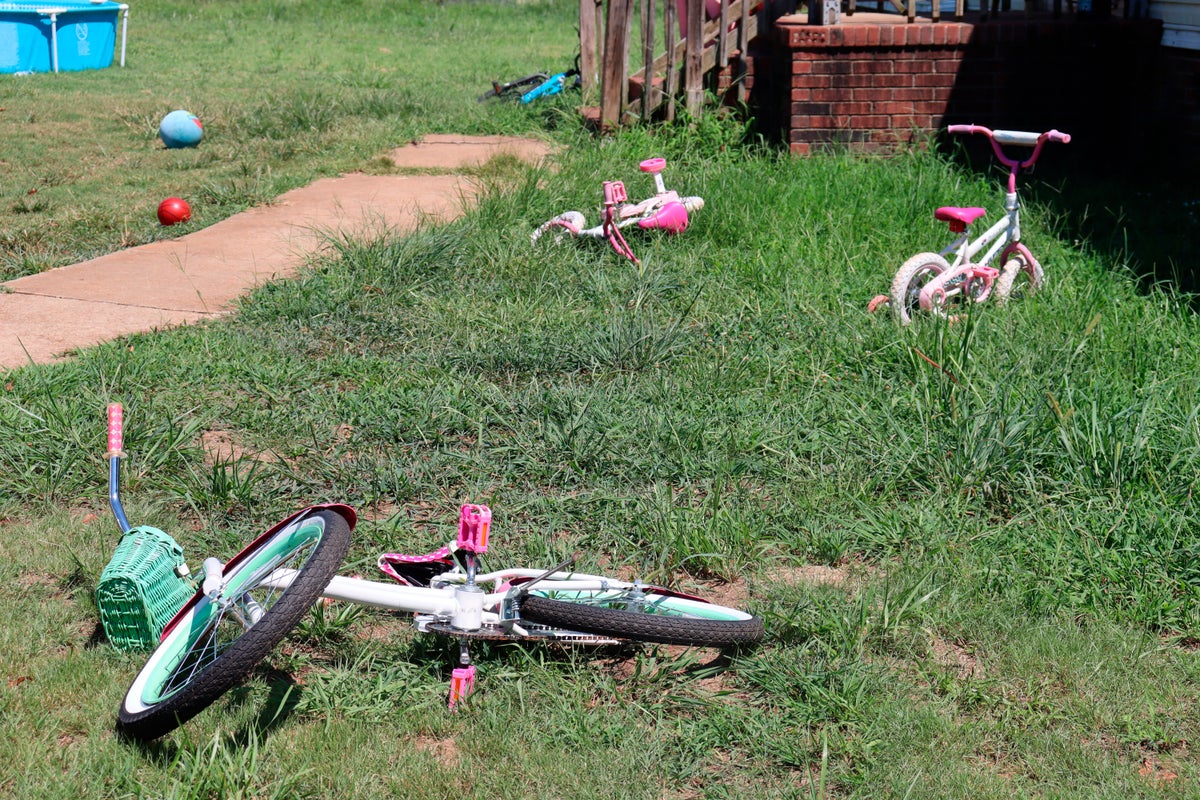
Nicholas Skylar Lucas’ gunfire typically hit the bullet-riddled rusty trash can or fallen satellite dish in his backyard, much to some residents’ discontent.
But on Saturday, Aug. 27, bullets from the intoxicated 30-year-old man’s .45-caliber handgun fatally struck Kesha Luwan Lucille Tate, his 42-year-old neighbor and parent to nine children, according to local authorities.
Lucas now faces a murder charge after crime scene technicians said they disproved his initial claim that the shots ricocheted off the dish. The “pristine” bullet could not have deflected off the target before reaching Tate’s chest, officials determined. The only way she could have been struck, according to the local sheriff's office, is if the shooter turned in her direction and intentionally fired.
Over the past two weeks, Tate's family has navigated the sudden reality of life without the mother, niece and sister they say held them together. They are seeking legal changes without the woman they described as their strongest fighter. And they don't want to see Tate join the long list of forgotten gun violence victims.
Songbird Lane lies nearly 6 miles (9.6 kilometers) north of downtown Gaffney, a 12,700-person upstate city whose status as South Carolina's “peach capital” is marked by a 135-foot (41 meter) water tower resembling the pitted fruit. Farm fields line parts of the drive into town. Most trailers sit on property whose boundaries lack fencing. By neighbors’ accounts, Songbird Lane was a quiet country street where the mobile homes’ residents mostly kept to themselves.
At the bond hearing, Lucas said the shooting was a “complete accident." He denied intentionally killing Tate.
“I’m really confused about this whole situation," Lucas said. “I’ve done all kinds of yard work for this lady and everything.”
Tate's own children described a grislier scene inside the trailer.
Their mother had been cooking dinner that summer evening while Lucas and his friends were shooting at targets in his backyard, according to family members who heard her children's account. Standing at her backdoor, less than 50 feet (15 meters) from the fallen satellite dish, Tate asked her neighbor to stop firing his gun.
Tate pulled back the curtain a few minutes later when Lucas began shooting again.
"When she looked out the window she yelled,” said Terry Manning, her brother-in-law, who relayed the children's account to The Associated Press. She'd been shot.
One week later, children's bicycles remained in the front yard. Window panes on the back door were shattered. Manning and Denise Tate, Kesha's sister, cleaned stains off the wall but said they could not rid the carpet of blood.
“If that man got to know my sister he would've never killed her," Denise said. "She would've gave him a place to stay, foot to eat, clothes, all of that. Anything he needed, even for his family, she would've helped.”
Beyond seeking a guilty charge, the family said gun laws need to change. South Carolina had the country's ninth highest firearm mortality rate in 2020, according to data from the Centers for Disease Control and Prevention. They are pushing for a “Kesha Tate Target Law” that would make it illegal to shoot a firearm in a residential neighborhood.
Cherokee County Sheriff Steve Mueller said his office received no reports of Lucas firing his weapon at that property over the past year. Even if neighbors had complained about the regular gun shots, Mueller said no ordinance exists outlining Lucas' behavior as illegal. The local sheriff’s office has been collecting court records from other jurisdictions to determine whether he could legally own a firearm.
Court records show Lucas had previously been convicted in North Carolina of assault and theft. South Carolina state law bars handgun ownership for anyone convicted in any state of burglary, robbery or “assault with intent to commit any offense punishable by imprisonment for more than one year," among other such “crimes of violence.”
The family is also seeking therapy for themselves and the children, who are taking a break from school. Kesha's 4-year-old daughter can’t comprehend the tragedy, but Denise said she knows she hasn’t seen her mother lately.
Interviews with family, friends and acquaintances revealed a woman committed to her community. She would “give you the shirt off her back,” said neighbor Latosha McFadden. She was a “social butterfly” who would “make sure you have a good time,” said Manning. She “could make anyone laugh,” said Beverly Wray.
Wray — Kesha's aunt who was known as her mother — recalled her own most recent birthday in February. Kesha bought her a dress, told her to put on her heels and took her out to eat, where she'd planned a surprise party. “That's how she is,” Wray said.
For Denise, she was the family’s concrete.
Denise recalled trips as a pre-teen with her sister to Brannon's Seafood, which “had the best peach cobbler in the world.” After school, Kesha would buy each of them a slice.
“She always made sure I was taken care of. Even as an adult she was always there. She was my backbone,” Denise said. “So I gotta keep it together and stay strong for these kids and her grandson.”
The family all echoed that sentiment: Kesha's commitment to them must be passed forward in caring for her nine surviving children, several of whom have lost their fathers.
Family members emphasized that they want to raise the children between themselves. They don't want them separated in the foster care system. Traleekia Tate, Kesha's oldest daughter, organized a GoFundMe that has raised more than $11,000. Growing up, she said her mother instilled in her that the family would always take care of each other.
“I miss her," she said. "I just feel like she built me for this.”







